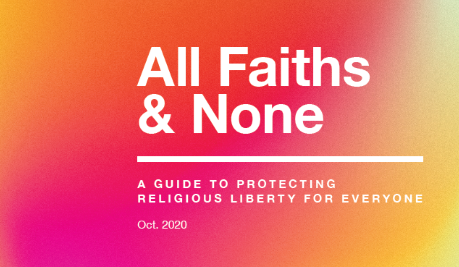Legal Scholars & Theologians Partner on an Ambitious Vision for Religious Liberty
Oct. 6, 2020—To safeguard the right to religious freedom, the next presidential administration must end the hyper-surveillance of Muslims, welcome religious refugees, protect land sacred to Native communities, restore church-state separation, and withdraw policies that favor particular religious beliefs, argues a new report co-authored by the Law, Rights, and Religion Project at Columbia University (LRRP) and Auburn Seminary.
LRRP and Auburn are hosting a short briefing on the report today, Oct. 6, 2020 at 4pm ET. Watch on Zoom at bit.ly/allfaithsbriefing.
Titled “All Faiths and None: A Guide to Protecting Religious Liberty for Everyone,” the report posits that policymakers have lost sight of the meaning and purpose of the First Amendment’s guarantee of religious freedom, and offers guidance on what the incoming administration must do to protect free exercise rights for all, not merely a favored few. Its recommendations are organized around a set of guiding principles: religious liberty must be neutral; noncoercive; nondiscriminatory; not absolute; democratic; and pluralistic. The report is accompanied by a Media Guide for journalists offering ways to hone new questions for policymakers and advocates claiming to protect religious liberty.
The report is being released the same day as the Supreme Court hears arguments (by phone—listen here) in Tanzin v. Tanvir—a religious liberty suit involving Muslim men who were punished by the FBI for refusing to spy on their religious communities. The case has received a fraction of the attention as earlier religious liberty lawsuits brought by conservative Christians.
“For far too long, policymakers have ignored the needs of those whose religious liberty rights are most at risk—non-Christians, the non-religious, and religious progressives,” says Elizabeth Reiner Platt, LRRP’s Director. “We wrote this report to put the focus back where it belongs: on the communities that have been subject to discriminatory government surveillance, the destruction of their sacred spaces, unwanted proselytizing within government programs, and denigration of their beliefs by those in power.”
“We’re living in an increasingly plural society and there’s such a temptation to retreat into silos,” says Dr. Keisha E. McKenzie, Senior Vice President of Programs at Auburn Seminary. “But religious liberty is a legal expression of the deeper social and spiritual ethics of care, respect, and mutuality. These ethics nourish thriving communities, and we need to protect religious freedom for all faiths and none.”
Download All Faiths and None
For Policymakers: All Faiths and None Policy Guide to Protecting Religious Liberty for Everyone (pdf)
For Journalists: Media Guide to Asking the Hard Questions About Religious Liberty (pdf)

